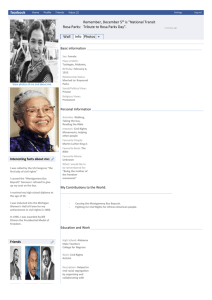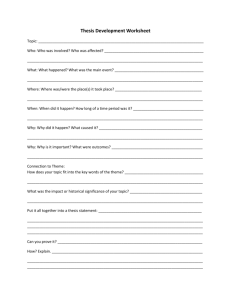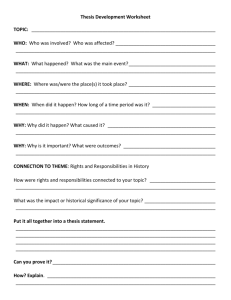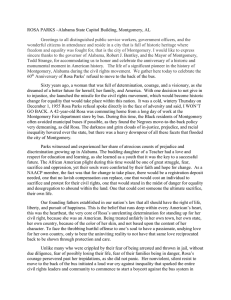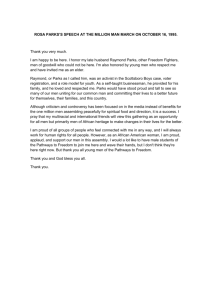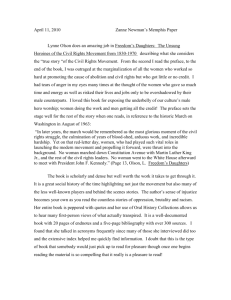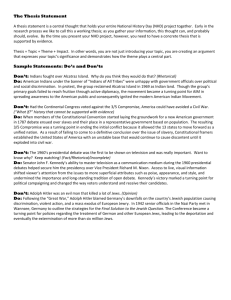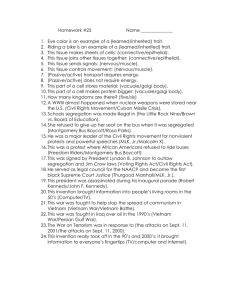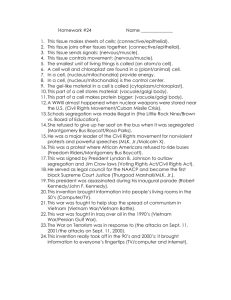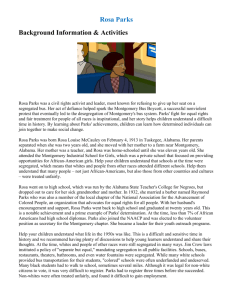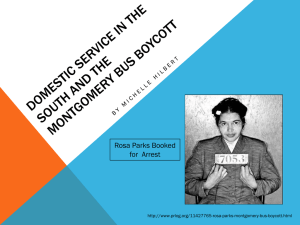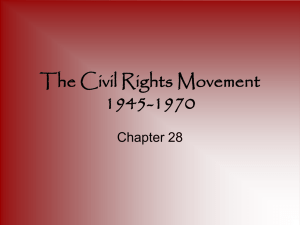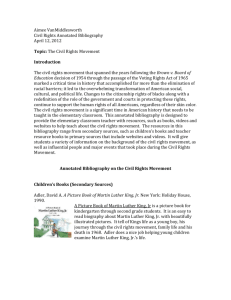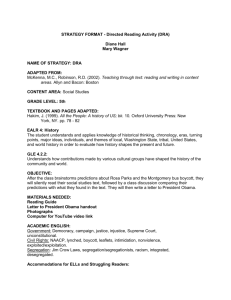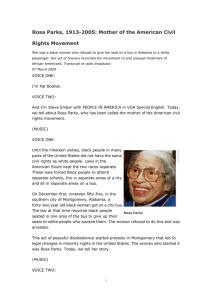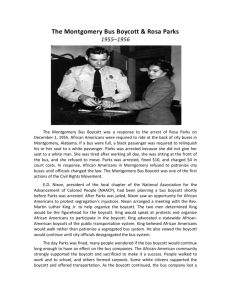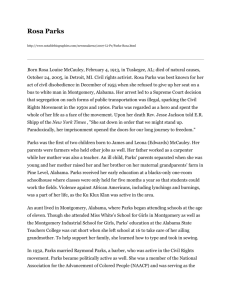Article
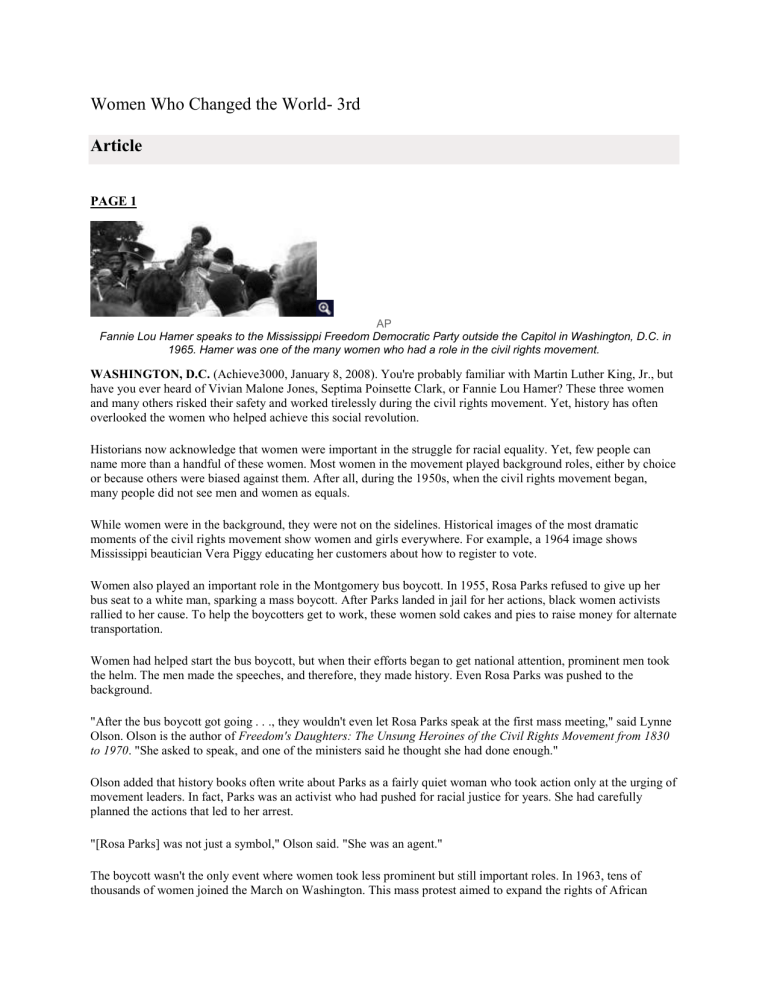
Women Who Changed the World- 3rd
Article
PAGE 1
AP
Fannie Lou Hamer speaks to the Mississippi Freedom Democratic Party outside the Capitol in Washington, D.C. in
1965. Hamer was one of the many women who had a role in the civil rights movement.
WASHINGTON, D.C.
(Achieve3000, January 8, 2008). You're probably familiar with Martin Luther King, Jr., but have you ever heard of Vivian Malone Jones, Septima Poinsette Clark, or Fannie Lou Hamer? These three women and many others risked their safety and worked tirelessly during the civil rights movement. Yet, history has often overlooked the women who helped achieve this social revolution.
Historians now acknowledge that women were important in the struggle for racial equality. Yet, few people can name more than a handful of these women. Most women in the movement played background roles, either by choice or because others were biased against them. After all, during the 1950s, when the civil rights movement began, many people did not see men and women as equals.
While women were in the background, they were not on the sidelines. Historical images of the most dramatic moments of the civil rights movement show women and girls everywhere. For example, a 1964 image shows
Mississippi beautician Vera Piggy educating her customers about how to register to vote.
Women also played an important role in the Montgomery bus boycott. In 1955, Rosa Parks refused to give up her bus seat to a white man, sparking a mass boycott. After Parks landed in jail for her actions, black women activists rallied to her cause. To help the boycotters get to work, these women sold cakes and pies to raise money for alternate transportation.
Women had helped start the bus boycott, but when their efforts began to get national attention, prominent men took the helm. The men made the speeches, and therefore, they made history. Even Rosa Parks was pushed to the background.
"After the bus boycott got going . . ., they wouldn't even let Rosa Parks speak at the first mass meeting," said Lynne
Olson. Olson is the author of Freedom's Daughters: The Unsung Heroines of the Civil Rights Movement from 1830 to 1970 . "She asked to speak, and one of the ministers said he thought she had done enough."
Olson added that history books often write about Parks as a fairly quiet woman who took action only at the urging of movement leaders. In fact, Parks was an activist who had pushed for racial justice for years. She had carefully planned the actions that led to her arrest.
"[Rosa Parks] was not just a symbol," Olson said. "She was an agent."
The boycott wasn't the only event where women took less prominent but still important roles. In 1963, tens of thousands of women joined the March on Washington. This mass protest aimed to expand the rights of African
Women Who Changed the World- 3rd
Americans. The crowd witnessed a tribute to prominent women, heard songs by several women, and listened to brief remarks by entertainer Josephine Baker. Still, no woman made a speech that day.
Many women who attended the March on Washington could have spoken. There was Septima Poinsette Clark, often called the "queen mother" of civil rights. Clark was an educator and a National Association for the Advancement of
Colored People (NAACP) activist decades before the nation's attention turned to racial equality. There was Fannie
Lou Hamer, who tried to register to vote in 1962 and was later jailed, even though she had not broken the law.
African Americans had the right to vote at the time. Hamer later organized voter registration drives to get more
African Americans to the polls. She co-founded the Mississippi Freedom Democratic Party and gave a fiery speech at the 1964 Democratic National Convention. There was Vivian Malone Jones, who defied the law by enrolling in the all-white University of Alabama in 1963. Jones later worked in the civil rights division of the U.S. Justice
Department.
Some of these women were prevented from speaking at the march; others did not want to speak, believing that the movement should place more emphasis on ordinary people than on leaders. As a result, most women in the civil rights movement were not well known—then or now.
"Making a true difference doesn't always come with fanfare," said Katherine J. Kennedy. She directs Boston
University's Howard Thurman Center, which organizes human rights programs on campus.
"There's a Chinese saying, 'Women hold up half the world,"' said Julian Bond, a civil rights historian at the
University of Virginia and chair of the NAACP. "In the case of the civil rights movement, it's probably threequarters of the world."
The Associated Press contributed to this story.
PAGE 2
Dig Deeper
Photo credit: AP
This is Rosa Parks. She went to jail for trying to change an unfair law.
Jo Ann Robinson worked in the civil rights movement. She was also a teacher at Alabama State College in
Montgomery, Alabama. In 1949, Robinson got on a bus in Montgomery and sat near the front. The driver did not treat her nicely—he yelled at her. Robinson was African American. The city had a law that said that African
Americans had to sit in the backs of buses. Robinson decided to work toward changing this law.
Robinson joined the Women's Political Council (WPC). This was a group started in Montgomery that worked to
Women Who Changed the World- 3rd change laws that were unfair to African Americans. Not long after, Robison became the leader of the WPC. She suggested that the group work to change the bus law. In 1955, a woman named Rosa Parks got on a bus and was told to go to the back. She said no. Parks wanted to show people what was happening to African Americans on buses in
Montgomery. That night, Jo Ann Robinson passed out a paper she had written that told people to stop riding buses.
Martin Luther King, Jr. helped get the word out. It took more than one year, but the plan worked. The bus company was losing money, and the law was changed.
Dictionary
activist (noun) someone who takes action for a cause biased (adjective) having an unfair preference for or dislike of something emphasis (noun) special importance fanfare (noun) publicity or attention
Montgomery bus boycott (noun) a Montgomery, Alabama, civil rights campaign in which participants refused to ride city buses until African Americans were allowed to sit in the front seats as well as the rear seats
